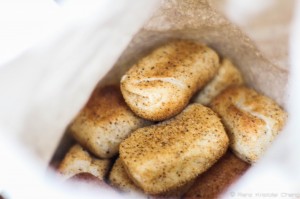
Alternatives need not be expensive.
Malunggay-based bread, native delicacies like “biko” and banana cue can replace store-bought “chichirya” that’s loaded with sugar and preservatives.
With public schools opening on Monday, the health of young students should be paramount, said the Department of Education in Central Visayas (DepEd-7).
“If they just ignore our reminders then school children are vulnerable to loose bowel movement or food poisoning,” said Grace Espos, DepEd-7 nutritionist-dietitian.
She discouraged school canteens from selling sugary soft drinks and junk food.
“If they sell junk food, then they should make sure these are fortified with vitamins, she said.
Instead of selling juice made from artificial powder, she said it’s better to prepare juice from real fruit extracts or fresh sources like “buko” (coconut water).
Malunggay “pan de sal”, for example, is readily available now in local bakeries.
Espos explained that malunggay is high in protein, calcium, Vitamin A, Vitamin B and other minerals that promotes the growth of children.
“We encourage each school to plant 50 malunggay trees and other vegetables in the school garden as a source for supplementary feeding,” she added.
She encouraged parents to prepare snacks at home like camote or banana cue, rice cakes, cuchinta, pichi-pichi, palitaw, puto cheese, maruya, siopao .
“Sometimes school children forget our native snacks because they are more exposed to commercial junk food,” she said.
Regional DepEd offices will monitor school canteens with the help of school supervisors and health workers to ensure that operators observe proper sanitation, preparation, storage and handling of food.
School canteens that don’t follow these standards will be issued warnings, and in some cases, their license to operate will be suspended.
The rules are found in DepEd’s manual on Revised Implementing Guidelines on the Operation and Management of School Canteens./ With UP Intern Angeli Sarmiento